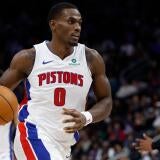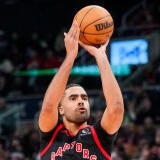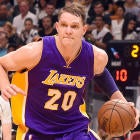Ranking 12 worst NBA contracts of infamous 2016 free agency, with most finally expiring this offseason
Many bloated contracts will come off the books this offseason, but which ones have been the biggest disasters?

In the summer of 2016, "Finding Dory" was dominating the box office, Drake's "One Dance" was hitting the airwaves and a sudden rise in the NBA salary cap -- from about $70M to $94M -- led to a free-agent feeding frenzy. Simpler times, indeed.
Perhaps the biggest bombshell of the 2016 NBA free agency period, made possible only by the salary cap spike, was Kevin Durant's essay on the Fourth of July stating that he would be leaving the Oklahoma City Thunder for his "next chapter" with the 73-win Golden State Warriors. This ushered in two seasons of Golden State basketball mastery and a countless number of Twitter burner accounts.
We knew things would get weird when Mike Conley signed a $153 million deal with the Memphis Grizzlies that summer, making him the highest-paid player in NBA history. And they sure did. Owners and front offices tore down the free-agent aisles like kids on a Toys 'R Us shopping spree, leading to some of the most mind-boggling signings we've ever seen.
Those contracts, for the most part, are mercifully set to expire this offseason, so it seems like a good time to look at which contracts have actually turned out to be the worst. To do that, we took a relatively objective approach, comparing the total dollar amount of the deal to the amount of win shares (per Basketball-Reference.com) that the player produced over the duration of their contract. By doing this, we can calculate how much money a player was paid per win share. For example, LeBron James' two-year, $64 million 2016 contract with the Cavaliers (he opted out of the third year) means they paid him $2.4 million per win share. A mid-level player like Eric Gordon, who signed with the Rockets for $53 million in 2016, has earned $4.5 million per win share over the four years of his contract.
Needless to say, the cost per win share of the players on this list are much higher. Keep in mind that nobody is blaming these players for not living up to their contracts -- their value is whatever teams were willing to pay them. In some cases it's even hard to blame the team's front office, as injuries have a sinister way of making contracts look terrible. That being said, some of these deals were awful the day they were signed, and only look worse now.
Worst Contracts of 2016
12. Allen Crabbe, Portland Trail Blazers -- 4 years, $75M
- Cost per win share: $9.25M
Crabbe hasn't lived up to the dollar figure, to say the least, but he was relatively durable until last year (234 games in four seasons) and has made 39 percent of his 3-pointers over the span of the contact. Injury problems have hurt his value over the last two seasons.
11. Nicolas Batum, Charlotte Hornets -- 5 years, $120M
- Cost per win share: $9.3M (fifth season projected)
Everyone knew the Hornets overpaid for Batum at the time, but they're a small-market franchise that's had trouble drawing high-profile free agents, so it was excusable. The versatile point-forward was decent in his first two seasons of the contract (13.5 points, 5.7 assists, 5.6 rebounds, 8.0 win shares), but he's fallen off a cliff over the last two years. The worst part of Batum's contract? He has one of the rare 2016 deals that goes for five years instead of four, so it will likely look even worse following the 2020-21 season.
T-9. Ian Mahinmi, Washington Wizards -- 4 years, $64M
- Cost per win share: $10.7M
Mahinmi showed promise in his contract season with the Pacers, averaging 9.3 points and 7.1 rebounds in fewer than 26 minutes per game, and it earned him a huge payday with the Wizards. Things never quite took off for Mahinmi in our nation's capital, as a combination of injuries and poor performance limited his minutes.
T-9. Solomon Hill, New Orleans Pelicans -- 4 years, $48M
- Cost per win share: $10.7M
Hill got off to a decent start to his contract with the Pelicans in 2016-17 before a serious hamstring injury derailed his 2017-18 season. He never quite found his bearings after that, though he was having a solid season for the upstart Grizzlies (5.7 points, three rebounds, two assists, 38 percent 3-pointers in 18.8 minutes per game) before being traded to the Heat in the Andre Iguodala deal. He's a good glue guy and, by all accounts, a good locker room presence, but Hill's contract is one of the worst of 2016 in terms of value.
8. Kent Bazemore, Atlanta Hawks -- 4 years, $70M
- Cost per win share: $12.3M
Bazemore put up decent numbers with the Hawks in three seasons (11.8 points, 3.6 rebounds, 2.7 assists) but his poor efficiency (41 percent field goals, 35 percent 3-pointers) and the Hawks' tendency to lose a lot of games really hurts his value. Things got worse this season in Portland, but he's looked good in 21 games since being traded to the Kings, averaging 10.3 points on 39 percent 3-point shooting.
7. Evan Turner, Portland Trail Blazers -- 4 years, $75M
- Cost per win share: $13.6M
Turner's value can't necessarily be judged by stats, but it's impossible to argue that he's lived up to his hefty 2016 contract. He hasn't been able to consistently make 3-pointers (27 percent in his last four seasons), which made him increasingly less productive over the course of his contract as the NBA evolved.
6. Joakim Noah, New York Knicks -- 4 years, $72M
- Cost per win share: $16M
You might have expected to see Noah's contract higher on this list, but he's actually been decent when he's been on the floor over the past four seasons -- he's just rarely on the floor. There were signs that Noah's body was breaking down in his final season in Chicago, but the Knicks chose to take a risk that ultimately did not pay off.
5. Matthew Dellavedova, Milwaukee Bucks -- 4 years, $38.4M
- Cost per win share: $16.7M
Coming off a title with the Cavaliers, Delly cashed in with a nearly $40 million deal with the Bucks, and it clearly didn't go the way Milwaukee hoped. After falling out of the rotation with the Bucks last season, he was sent back to Cleveland to help mentor their young players.
4. Miles Plumlee, Milwaukee Bucks -- 4 years, $52M
Cost per win share: $28.9M
Yeah, 2016 wasn't a great summer for the Bucks. But hey, they're the best team in the NBA now so they can look back and laugh at it. After signing his deal, Plumlee lasted just five months in Milwaukee before he was traded to the Hornets for Spencer Hawes and Roy Hibbert. He was traded twice more after that, and hasn't played a game since being waived by the Grizzlies just before the 2019-20 season.
3. Luol Deng, Los Angeles Lakers -- 4 years, $72M
- Cost per win share: $42.4M
The Lakers reportedly got $7.5 million back when they bought out Deng in 2018, but this contract is one of the worst of all time. It seemed like a decent (but slightly ambitious) idea at the time, adding a veteran to a young, rebuilding Lakers squad following the retirement of Kobe Bryant, but it didn't work out for whatever reason. Deng played just 57 games with the Lakers in two seasons before the buyout and, after a stint with the Timberwolves, officially retired before the 2019-20 season.
2. Timofey Mozgov, Los Angeles Lakers -- 4 years, $64M
- Cost per win share: $42.7M
Isn't it ironic that the NBA's two best teams during the 2019-20 season, the Bucks and Lakers, each have two players in the top five worst contracts of 2016? It's just proof that smart decisions and a bit of good fortune can (sometimes) undo the mistakes of the past. As for Mozgov, it was clear pretty early that his place in the modern game was quickly disappearing, and the Lakers traded him to Brooklyn as part of the D'Angelo Russell deal in 2017. Mozgov last played in the NBA in 2018.
1. Chandler Parsons, Memphis Grizzlies -- 4 years, $94.8M
- Cost per win share: $79M
Parsons' contract will expire this offseason after just 100 games in four injury-plagued seasons. He was never able to play consistently enough to regain the form that earned him the contract in the first place, but he should by no means be the poster boy for bad 2016 contracts. An incredibly versatile, promising wing, he was just 27 years old when he signed the deal, and he's exactly the piece those Grit N' Grind Grizzlies were missing. There's no telling how far they could have gone had Parsons stayed healthy. Unfortunately, that's the gamble teams take when they sign players to multi-year deals for big bucks.
Not As Bad As You Thought
Let's take a glimpse at some of the familiar names that may have been more productive than you suspected. There are a lot of players who get lumped in with the albatross contracts of 2016, but don't necessarily deserve it. When you look at the numbers, these contracts certainly weren't good, but they're far from the disasters we saw in the top 12.
Ryan Anderson, Houston Rockets -- 4 years, $80M
Before Anderson's body failed him, he was essential to the Rockets' offensive attack by spacing the floor well beyond the 3-point line. In the 2016-17 and 2017-18 seasons, he averaged 11.6 points and 4.8 rebounds per game while making 40 percent of his 6.1 3-point attempts.
Jon Leuer, Detroit Pistons -- 4 years, $42M
It looks bad now because he only ended up playing 124 games in four seasons due to injuries, but Leuer was productive in his first season of the contract (10.2 points, 5.4 rebounds in 26 minutes per game). In fact, midway through that season Leuer's contract was actually ranked by one website as the fifth-best deal of 2016. My, how things can change.
Bismack Biyombo, Orlando Magic -- 4 years, $70M
Paying $70 million for Biyombo seems ludicrous in hindsight, but he's actually been relatively productive in his minutes. He's been durable (270 games in four seasons), which goes a long way to fulfilling the value of your contract, and has actually contributed 10.3 win shares with the Magic and Hornets over the span of his contract.
Courtney Lee, New York Knicks -- 4 years, $48M
Lee averaged double-figure points in his first two seasons with the Knicks while shooting over 40 percent on his 3-pointers, providing pretty good value on his contract before he was traded to the Mavericks in the Kristaps Porzingis deal.
Tyler Johnson, Miami Heat -- 4 years, $50M
Johnson famously said he "threw up a couple of times" in 2016 when he heard how much money he was about to make, and most probably see the deal as a failure. But Johnson averaged double-figure points while playing nearly 30 minutes per game in two-and-a-half seasons in Miami, providing 6.8 win shares during that time. It's not even close to one of the worst contracts of 2016.

























